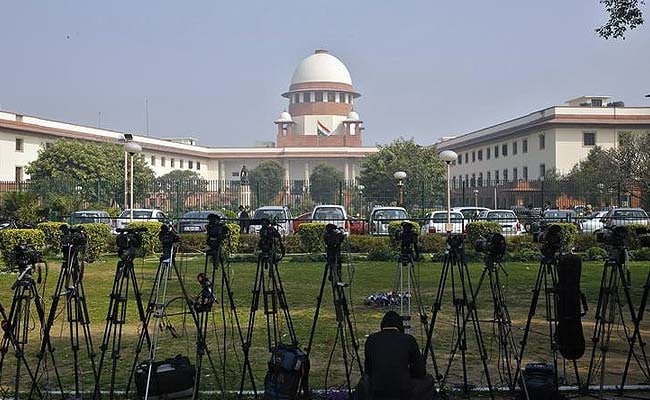
New Delhi:
From Sunday, commercial vehicles entering Delhi will have to shell out 'Environment Compensation Charge' (ECC) ranging from Rs 700 to Rs 1300 with the Supreme Court refusing to modify its earlier order on the issue.
The ECC, which will be in addition to the toll tax the commercial vehicles have to pay while entering the national capital, has been imposed to check pollution caused by such vehicles.
A bench headed by Chief Justice HL Dattu and Justice Amitava Roy declined the plea of SMYR Consortium LLP, which has been levying toll on behalf of MCD, seeking directions from the top court to "defer" the order till December one.
The Consortium has contended that levy of court-mandated ECC is beyond the terms of agreement entered into between it and the civic body and new pact has to be reached factoring the court's directions.
The top court took into account the response of Solicitor General Ranjit Kumar who opposed the plea of the consortium saying,"at the behest of the contractor, let this court not overlook the larger issue involved in the petition."
The Centre's counsel said that the steps have been taken keeping in mind the interest of public at large.
Advocate Aprajita Singh, who was appearing in absence of senior advocate Harish Salve, submitted that the idea was to bring the notification before the onset of the winter and now the smog was already visible in the atmosphere.
She said postponing the notification would defeat the very purpose for which this order was passed and it was also made clear in the order that it was on experimental basis. Senior advocate Shyam Divan, appearing for the consortium, said some more suggestions are required to come for effective implementation of the notification which can come from Salve, amicus curiae in the case.
The top court had on October 12 announced an ECC of Rs 700 and Rs 1,300 ECC to be imposed on commercial vehicles entering Delhi from November 1.
It had held that the order would remain operational for four months till February 29, 2016 on an "experimental basis".
It had directed Delhi government to issue an appropriate notification in this regard and said that passenger buses, vehicles carrying essential commodities, food articles and ambulances would be exempted from paying ECC.
Taking note of the Centre for Science and Environment's study that about 23 per cent of the commercial vehicles and 40-60 per cent of the heavy trucks entering the city were not destined for Delhi, the court had said it was necessary to impose the charges, along with the MCD toll, to equalize the difference in cost in travelling through alternative routes.
The ECC, which will be in addition to the toll tax the commercial vehicles have to pay while entering the national capital, has been imposed to check pollution caused by such vehicles.
A bench headed by Chief Justice HL Dattu and Justice Amitava Roy declined the plea of SMYR Consortium LLP, which has been levying toll on behalf of MCD, seeking directions from the top court to "defer" the order till December one.
The Consortium has contended that levy of court-mandated ECC is beyond the terms of agreement entered into between it and the civic body and new pact has to be reached factoring the court's directions.
The top court took into account the response of Solicitor General Ranjit Kumar who opposed the plea of the consortium saying,"at the behest of the contractor, let this court not overlook the larger issue involved in the petition."
The Centre's counsel said that the steps have been taken keeping in mind the interest of public at large.
Advocate Aprajita Singh, who was appearing in absence of senior advocate Harish Salve, submitted that the idea was to bring the notification before the onset of the winter and now the smog was already visible in the atmosphere.
She said postponing the notification would defeat the very purpose for which this order was passed and it was also made clear in the order that it was on experimental basis. Senior advocate Shyam Divan, appearing for the consortium, said some more suggestions are required to come for effective implementation of the notification which can come from Salve, amicus curiae in the case.
The top court had on October 12 announced an ECC of Rs 700 and Rs 1,300 ECC to be imposed on commercial vehicles entering Delhi from November 1.
It had held that the order would remain operational for four months till February 29, 2016 on an "experimental basis".
It had directed Delhi government to issue an appropriate notification in this regard and said that passenger buses, vehicles carrying essential commodities, food articles and ambulances would be exempted from paying ECC.
Taking note of the Centre for Science and Environment's study that about 23 per cent of the commercial vehicles and 40-60 per cent of the heavy trucks entering the city were not destined for Delhi, the court had said it was necessary to impose the charges, along with the MCD toll, to equalize the difference in cost in travelling through alternative routes.
Track Latest News Live on NDTV.com and get news updates from India and around the world

